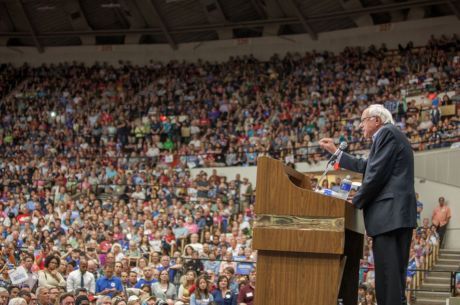News
You are here
Feel the Bern!

March 1, 2016
On Saturday, February 20, Hillary Clinton beat Bernie Sanders in the Nevada Democratic Caucus by a margin of five percentage points. As of this writing, she leads in South Carolina by a margin of twenty five percentage points, and will likely win most of the Southern states on Super Tuesday, which could put her at over a thousand pledged delegates. With gigantic corporate donations, pledges from the Democratic Party’s unaccountable super delegates, and support of the entire mainstream media, Hillary Clinton has a lock on the democratic nomination and winning odds on the White House.
But this is only half the story. There is a movement developing around Sanders. A long time independent, self-described democratic socialist has won New Hampshire in a landslide and come in a virtual tie in Iowa. Only long shot gamblers would put him in the Oval Office come March 2017, but he’s done something maybe more important. He’s reflected the movements and created a mass audience for socialist politics.
Since declaring his candidacy, Bernie has received over four million individual donations. He’s received endorsements from unions across the country, as well as from progressive congressional candidates like Zephyr Teachout (New York Congress), John Fetterman (Pennsylvania Senate), and Lucy Flores (Nevada Congress). He’s received (qualified) support of Kshama Sawant and the Socialist Alternative for his progressive policies. He’s running for party nomination alongside Black Lives Matter organizer DeRay Mckesson, who is running to be the Democratic nominee for the mayor of Baltimore.
Sanders vs Clinton
Sanders has changed the tone of the debate in the establishment. When Clinton began seeking the nomination, she touted herself as a dealmaker and an effective moderate. Since the Bernie campaign began eating away at her base, she had to change tactics. The Clinton campaign has now begun emphasizing that they will raise the minimum wage. They’ve highlighted her significant work with women’s rights in the United States. He’s made her campaign and platform significantly more progressive.
And that’s not enough. Establishment newspapers like the New York Times have begun to couch and qualify their endorsements of Hillary Clinton. A recent editorial has called on Clinton to match Mr. Sanders pledge to raise the national minimum wage to $15 per hour. The newspaper says that her promise of $12 per hour is not substantial enough to combat growing inequality, nor does it raise the working class above the poverty line in many states. Major economists have endorsed Mr. Sanders’ single payer health care plan as not only more humane, but also more cost effective. Gerald Friedman, professor of economics at University of Massachusetts Amherst, say that under Sanders tax and business plans, American poverty rates would drop to a record low of 6 per cent, median income would increase by $22,000 per household, and the nation would quit running deficits by the end of Sanders’ second term.
Sanders also represents a different kind of internationalist American politician. Despite its flaws, he’s condemned the Kissinger influenced tactics of Hillary Clinton and has emphasized diplomacy over unilateral military action.
What next?
His momentum has called into question the notion of a non-democratically chosen superdelegate. Despite winning one state, tying one, and losing one by five points, Clinton has 502 delegates to Sanders’ 70. With Clinton already having troubles with trustworthiness and transparency, her reliance on the establishment to secure the nomination is thrusting the problems of the Democratic Party into the spotlight.
All those successes aside, Bernie has accomplished one incredible feat. He’s made the American public shed the muck of the ages with their McCarthy-esque fear of socialism, and embrace the word Socialism and the inequality message of Occupy. He’s assembled thousands of working class people across all 50 states, calling loudly for a $15 an hour minimum wage, universal health-care, free college education. Thousands shouting for less military action, accountable banks, and equal rights for all. For unions, for Black Lives Matter, for women’s rights.
Regardless of who wins the Democratic nomination, this group must continue beyond his campaign, into activism, municipal politics, revolutionary parties. It is a group of thousands loudly declaring themselves as socialists, as progressives, and realizing that united they are strong.
Section:
Topics:










